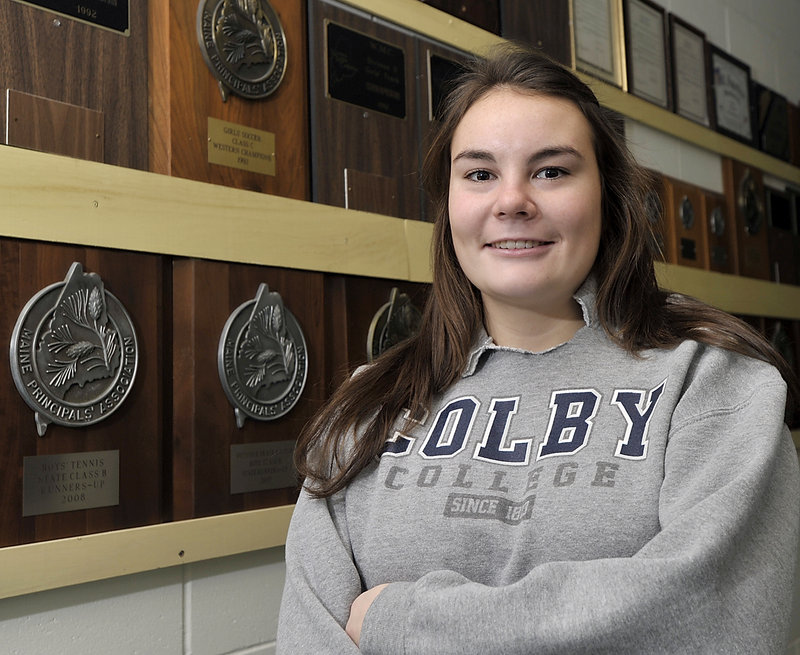FALMOUTH — Students in Falmouth are opposing a potential rule that would penalize them for attending a party where others are illegally taking drugs, drinking or smoking, even if they don’t do it themselves.
The reaction against the “knowingly present” policy came Friday at a roundtable discussion between students and administrators.
Officials say they are aiming to craft a broader approach that promotes overall wellness and students’ health. But the dozen Falmouth High School students said the policy would penalize them for doing nothing wrong.
“The intent of the clause is to shrink a party,” said Principal Gregg Palmer. “(We want) to have students say, ‘It’s not worth it.’ “
In discussions, some teenagers said that if the rule punishes them just for being at a party where drinking is going on, they might as well drink.
At Belfast High School, which has had a “knowingly present” policy for at least six years, administrators said it allows them to easily cut through messy allegations and claims of innocence.
“It really simplifies it, with all the social media and things we have out there today,” said Terry Kenniston, the school’s vice principal in charge of discipline.
Facebook photos have frequently caused consequences for athletes and others in extracurricular activities, Kenniston said.
“With our policy, if you’re there, there is a consequence,” he said.
Falmouth’s policy review process could stretch into March. It began in September, three months after a Falmouth couple, Barry and Paula Spencer, were each charged with nine counts of allowing a minor to consume or possess alcohol.
Police said they found students as young as 15 drinking and smoking marijuana at the party at the Spencers’ home on Fieldstone Lane.
The Spencers are due in Cumberland Superior Court on Dec. 26 for a status hearing. Each will face as much as $9,000 in fines if convicted.
Falmouth Superintendent Barbara Powers said the policy review was not prompted by the party in June, but that does provide a vivid backdrop for discussions this month between school officials and parents and other community members, who often see the potential for tragedy in what students view as teenage fun.
Administrators are also revisiting an unusual rule that lets members of a sports team or extracurricular group vote on whether captains or student leaders should keep those positions if they’re found drinking, smoking or doing drugs.
For Falmouth police, breaking up parties takes time and effort, said Chief Edward Tolan, who acknowledged that some drinking and drug use by teenagers is inevitable. He said he would prefer that the courts offer an education course to give first-time offenders a chance to reform.
“We’d rather make an impression on them so they take an alternative,” Tolan said. “We just want to prevent the tragedies.”
Athletic Director Cooper Higgins, a 40-year veteran of the school system, said Falmouth is lucky that no students have been maimed or killed because of drinking or drug use.
He said it is difficult to craft fair rules.
“Everyone wants to come up with the 10 commandments that work,” he said. “It really comes down to parenting, and the peers having to stand up for each other.”
While some students at Friday’s roundtable meeting acknowledged the effect of peer pressure, others said the “knowingly present” policy would not be a strong deterrent. Others said it seems illogical to penalize one person for the conduct of another.
Molly Ryan, a student representative to the Falmouth School Board, said legislating behavior is extremely difficult, no matter how severe the penalties.
Many times, students base decisions more on their internal values than on the consequences they face if they’re caught, said Ryan, who plays three sports so is always “on code,” barred from any prohibited behavior.
“Half of the school doesn’t follow the policy,” said Ryan, who is 17. “Honestly, (good decisions) come from within.”
The “knowingly present” policy was enforced in Falmouth before 2006. Administrators dropped it after they grew tired of trying each Monday to sort out who attended which alleged party during the weekend, and interrogating students about which of their friends were present, Palmer said.
“It’s the least popular clause in the history of school clauses,” Palmer said, drawing laughs from the kids.
Higgins, the athletic director, saw the “knowingly present” policy differently.
“In some ways, it gives you an out,” he said. “It gives you an excuse to leave.”
Staff Writer Matt Byrne can be contacted at 791-6303 or at:
mbyrne@mainetoday.com
Send questions/comments to the editors.




Success. Please wait for the page to reload. If the page does not reload within 5 seconds, please refresh the page.
Enter your email and password to access comments.
Hi, to comment on stories you must . This profile is in addition to your subscription and website login.
Already have a commenting profile? .
Invalid username/password.
Please check your email to confirm and complete your registration.
Only subscribers are eligible to post comments. Please subscribe or login first for digital access. Here’s why.
Use the form below to reset your password. When you've submitted your account email, we will send an email with a reset code.